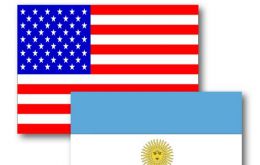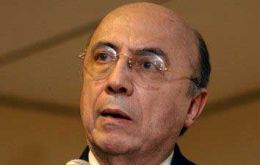MercoPress. South Atlantic News Agency
Economy
-
Saturday, July 12th 2008 - 21:00 UTC
US trade deficit falls in May; oil imports lowest since 2002
The United States trade deficit shrank in May even when average prices for imported oil surged during the month to a record, according to a US Department of Commerce release on Friday. The deficit narrowed to 59.8 billion US dollars from 60.5 billion in April as both exports and imports rose to record highs.
-
Saturday, July 12th 2008 - 21:00 UTC
US government moves into collapsed top mortgage lender

One of the largest United States mortgage lenders, the California-based IndyMac Bank, has collapsed amid a growing credit crisis. Federal regulators seized the bank's assets, fearing it might not be able to meet withdrawals by depositors. It is the second-largest financial institution to fail in US history, regulators say.
-
Saturday, July 12th 2008 - 21:00 UTC
US satisfied with Argentine handling of farmers' dispute

The United States said it was satisfied at the way the Argentine government is handling the dispute with the farmers, said Argentine Ambassador to the US Héctor Timerman on Friday, after participating in a meeting with the US Under-Secretary for Western Hemispheric Affairs Thomas Shannon and the Treasury Department Deputy Assistant Secretary for the Western Hemisphere Brian O'Neill.
-
Friday, July 11th 2008 - 21:00 UTC
Argentina's official June inflation 0.6% other estimates 1.5%
The Consumer Prices Index in Argentina increased 0.6% in June and 4.6% in the first half of the year. Wholesale prices jumped 1% in June totaling 6.3% in the first six months of 2008, both percentages according to the official Statistics and Census Office, Indec
-
Thursday, July 10th 2008 - 21:00 UTC
Brazil's Central Bank promises full action against inflation

The Brazilian Consumer price index unexpectedly slowed in June from May, though on an annual basis inflation remains at its fastest pace since November 2005, according to the latest report from the country's IBGE (Brazilian Geography and Statistics Institute) released on Thursday.
-
Thursday, July 10th 2008 - 21:00 UTC
Bank of England leaves interest rates on hold at 5%

United Kingdom interest rates have been kept on hold at 5% by the Bank of England following its latest meeting. The Thursday decision had been widely expected, despite calls from businesses groups to cut borrowing costs amid growing concerns about the economic slowdown.
-
Thursday, July 10th 2008 - 21:00 UTC
Brazil confirms merger and world's third largest bourse

Brazil's antitrust authority, Administrative Council for Economic Defence, CADE, approved the merger between the Bovespa stock exchange and the BM&F futures market, a spokesman said this week.
-
Wednesday, July 9th 2008 - 21:00 UTC
Argentina's soy king explains modern farming and taxing
Argentina's major soy businessman Gustavo Grobocopatel said that “modern farming has nothing to do with rich against poor”.
-
Wednesday, July 9th 2008 - 21:00 UTC
“Conflicts of interest” proven in three credit rating agencies
A report into the much-criticized activities of credit rating agencies has found conflicts of interest at the firms it studied. The US financial regulator, the SEC, found that the firms, which rate investments, had broken its rules.
-
Wednesday, July 9th 2008 - 21:00 UTC
Fed expects financial turmoil to persist and ready to rescue
The US Federal Reserve may extend into next year a facility that gives investment banks access to emergency cash if the financial turmoil persists. The lending facility was put in place in March to stabilize the financial system as Bear Stearns collapsed.
